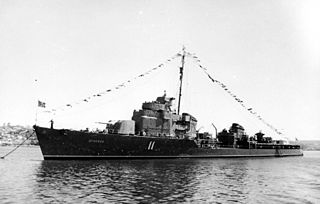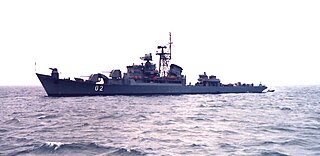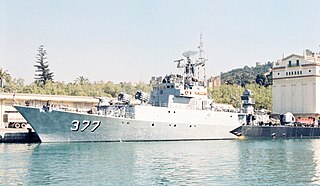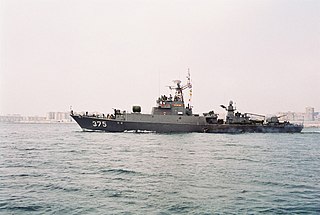
Whiskey-class submarines are a class of diesel-electric attack submarines that the Soviet Union built in the early Cold War period.

The Kashin class, Soviet designation Project 61, were series of anti-aircraft guided missile destroyers built for the Soviet Navy since the 1960s. As of 2020, no ships remain in service with the Russian Navy, but three modified ships continue in service with the Indian Navy as Rajput-class destroyers.

The Ognevoy-class destroyers were a series of destroyers built for the Soviet Navy during and immediately after World War II. The Soviet designation was Project 30 and Project 30K.

Neustrashimy was a destroyer built for the Soviet Navy in the early 1950s. She was to be the prototype for an extended production run but only one ship was built. Neustrashimy was considered too big for series production and a modified design, the Kotlin class was chosen for series production instead. The Soviet Designation was Project 41. This was the first Soviet ship to be given a NATO reporting name being called the Tallinn class.

The Riga class was the NATO reporting name for class of frigates built for the Soviet Navy in the 1950s. The Soviet designation for these ships was Storozhevoi KorablProject 50 Gornostay. The Riga class was analogous to World War II era destroyer escorts.

The Sonya class are a group of minesweepers built for the Soviet Navy and Soviet allies between 1971 and 1991. The Soviet designation is Project 1265 Yakhont.

The Soviet Project 183R class, more commonly known as the Komar class, its NATO reporting name, meaning "mosquito", is a class of missile boats, the first of its kind, built in the 1950s and 1960s. Notably, they were the first to sink another ship with anti-ship missiles in 1967.

The Matka class is the NATO reporting name for a group of hydrofoil missile boats built for the Soviet Navy. The Soviet designation is Project 206MR Vikhr. Following the 1997 Black Sea Fleet partition treaty all Black Sea Fleet Matka class boats were passed to the Ukrainian Navy.

ORP Wicher was a Project 30bis destroyer, transferred to the People's Republic of Poland from the Soviet Union in 1958. She was built by the Zhdanov shipyard in Leningrad and originally commissioned into the Soviet Baltic Fleet as the Skoryy ("Rapid") in 1951, and transferred to Poland in 1958 together with a second ship, ORP Grom. The ship was decommissioned in 1975, and scrapped. One of the 130 mm guns is preserved in the Polish Navy Museum in Gdynia.

KRI Sutanto (377) is a Kapitan Patimura-class corvette currently operated by the Indonesian Navy. Before her service in Indonesia, ship was part of the East German Volksmarine, as Prenzlau / Wismar (241).

KRI Teuku Umar (385) is a Kapitan Patimura-class corvette currently operated by the Indonesian Navy. Before her service in Indonesia, ship was part of the East German Volksmarine, as Grevesmühlen(212).

KRI Silas Papare (386) is a Kapitan Patimura-class corvette currently operated by the Indonesian Navy. Before her service in Indonesia, ship was part of the East German Volksmarine, as Gadebusch(211).

KRI Cut Nyak Dien (375) is a Kapitan Pattimura-class corvette currently operated by the Indonesian Navy. Before her service in Indonesia, the ship was part of the East German Volksmarine, as Lübz(221).

Pylky was a Skoryy-class destroyer of the Soviet Navy which later transferred to the Indonesian Navy and renamed KRI Diponegoro (306).
Bezzhalostny was a Skoryy-class destroyer of the Soviet Navy which later transferred to the Indonesian Navy and renamed KRI Brawidjaja (307).
Bezzavetny was a Skoryy-class destroyer of the Soviet Navy which later transferred to the Indonesian Navy and renamed KRI Sultan Iskandar Muda (304).
Bespokoyny was a Skoryy-class destroyer of the Soviet Navy which later transferred to the Indonesian Navy and renamed KRI Sandjaja (203).
Vnezapny was a Skoryy-class destroyer of the Soviet Navy which later transferred to the Indonesian Navy and renamed KRI Sarwadjala (204).
Vyrazitelny was a Skoryy-class destroyer of the Soviet Navy which later transferred to the Indonesian Navy and renamed KRI Singamangaradja (202).
Volevoy was a Skoryy-class destroyer of the Soviet Navy which later transferred to the Indonesian Navy and renamed KRI Siliwangi (201).
















